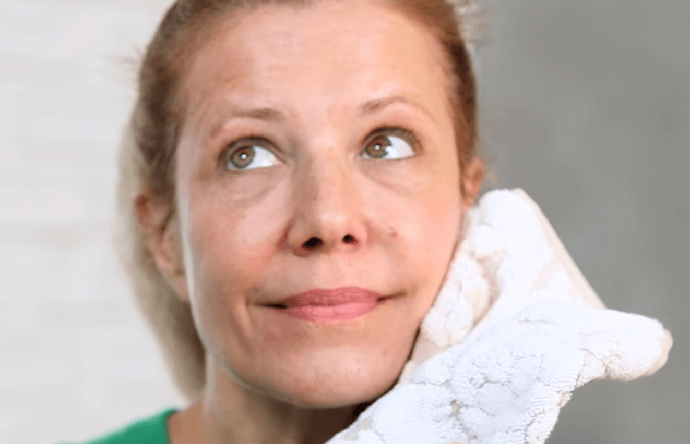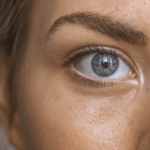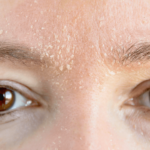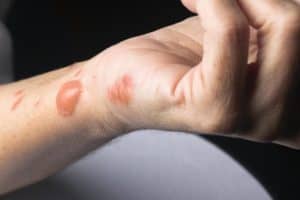A common frustration many have is after washing their face – their skin still feels oily. Perhaps you see clarity and freshness from the cleansed pores; however, oiliness persists. Why is this?
Why does the face get so oily after washing? Your face may get oily after washing it if you wash too often, use hot water, use harsh cleansers, or scrub harshly. These actions strip your skin of natural oil and cause it to produce excess oil to compensate.
Your sebaceous glands produce your skin’s natural oil, called sebum, which keeps your skin hydrated and healthy. In addition to washing too often or too harshly, you may produce too much oil for a number of reasons, including little sleep, too much stress, or a poor diet.
Read on to learn more about why your face gets so oily after washing it and how to make your skin less oily.
Also, for an excellent smoothing cleanser, take a look at our top pick, the ELEMIS Dynamic Resurfacing Facial Wash:
Click here to see it on Amazon.
Why Does My Face Get so Oily After Washing It? 8 Causes
As mentioned earlier, the main reason why your skin gets oily after washing it is that washing the face causes your sebaceous glands to produce oil.
If you wash your face too often, or with harsh cleansers, or you scrub too rough, then this will strip your skin of its natural oils. Your glands will then over-produce oil to compensate.
There are many other causes of oily skin, including heredity, your environment, as well as your lifestyle. Although you can’t easily get rid of oily skin, the following below are the causes and steps that will help you to make your skin less oily.
First, you must know what causes your skin to be oily. Knowing the cause of the problem first is the key to finding the perfect solution!
1. Heredity
Oily skin is largely hereditary. If your mom or dad has oily skin, it is possible that you may inherit it and have excessively active sebaceous glands, too.
2. Environment and Season
Your location and the current season are other major causes of oily skin. Many people tend to have oilier skin in hot, humid climates. The winter is the time for more dry skin, but those with very oily skin still suffer during the drier, colder seasons.
3. Washing and Exfoliating Your Skin Too Often
Do not overdo your skincare routine like washing your skin or exfoliating your face too often, as this can make your skin oilier too.
By over-washing your face, you’re washing away too much of your natural oil from the skin. Many think they need to over-wash their face to reduce the oiliness. But by over-washing, our sebaceous glands go into emergency mode and produce even more oil to make up for what was lost.
4. Using the Wrong Skincare Products
Everyone’s skin is unique, and this is why there are so many skincare products, from toners to moisturizers to serums – there are endless versions of each for each skin type.
It is really important to use the product that is the best match for your specific skin type. For example, if you have combination skin (oily skin in some areas of your face and dry skin in other areas), and you use heavy cream as your moisturizer, this will clog your pores and lead to your skin producing even more oil.
I’m a big fan of the Malin + Goetz Vitamin E Face Moisturizer, as it is lightweight, non-clogging, and has great ingredients.
Click here to see it on Amazon.
The moisturizer has vitamin E and B5 as well as soothing chamomile. It feels really great and absorbs quickly after applying.
5. Diet
They say you are what you eat. It’s important that we are conscious about what we eat as it affects not only our health but how we physically look on the outside.
Australian nutritionist, Zoe Dent, said “specific foods don’t directly cause oily skin. They cause an imbalance in our good and bad bacteria. This leads to a poor immune system and poor skin health.
Below are the main causes of our health imbalance that affects our skin health as per Dent:
- Eating too much dairy products – e.g., ice cream, milkshakes, cheese, butter, milk.
- Having too much sugar or eating too much sweet food e.g. soda, candies, lollipops.
- Not eating enough food with healthy omega-3 fats, zinc, probiotics, vitamins A, C, E, protein, and collagen.
- Eating too much of unhealthy food – e.g., processed foods, burgers, fries, pizza.
6. Large Pores
Enlarged pores can also be a reason for oily skin. As we age, our pores have the tendency to stretch out. A sudden change in weight and previous breakouts can also result in having enlarged pores.
The larger the pores, the more oil they produce. But again, no need to worry as there are several skincare tips for this kind of skin problem.
7. Hormonal Change
When going through the puberty stage, our androgens are at their peak levels. These hormones are responsible for causing our glands to produce more oil.
The more androgens we have in our system, the more sebum is produced and released through our skin pores.
The good thing is, as we age or once we get through the puberty stage, sebum production may change throughout the cycle.
8. Stress
The stress hormone, also called cortisol, may also cause an increase in oil production when we experience too much stress.
7 Tips to Prevent Oily Skin

1. Avoid Excess or Harsh Face Washing
Avoid washing your face or skin more than twice a day as it can lead to more oil production in the pores. Also, avoid using hot water, instead use lukewarm only.
Do not scrub your face; instead, gently splash the water on your face. Do not use any harsh facial scrubs or cleansers. As well, only exfoliate once or twice a week, at most.
I know it’s irritating to have that sticky feeling when your skin gets too greasy. What you can do is lessen the use of your facial wash. Instead, use plain lukewarm water whenever you feel your skin gets oily. In that way, your skin will still stay fresh and hydrated without over-drying it.
Use a soft paper towel if you tend to break out to remove excess oil. Just remember to lightly tap the face. When using a towel, lightly pat dry, don’t rub the skin.
2. Drink Plenty of Water
This is one of the common cures for nearly every health issue. Drinking ample amounts of water every day leads to fewer clogged pores. Staying hydrated with at least 2 liters or 10 glasses of water every day helps prevent having oily skin.
3. Choose the Right Skincare Products
Choose the products you use wisely and carefully. It’s better that you know what causes the oiliness of your skin. In that way, you’ll know the right product to constantly use in your skincare routine. Most dermatologists suggest using gentle cleansers and water-based moisturizers.
One of my favorite cleansers is the ELEMIS Dynamic Resurfacing Skin Smoothing Cleanser because it is so gentle and contains a ton of beneficial ingredients.
Click here to see it on Amazon.
It acts as a non-abrasive exfoliant, gently removing all impurities from your skin, leaving it feeling pure and renewed.
4. Avoid Excess Makeup
When dealing with oily skin, it’s also important that you choose the correct makeup for your skin and not put on too much makeup. Aside from using the right cosmetics, always have your skin cleansed and moisturized before putting any makeup on.
Look for makeup products that are oil-free or non-comedogenic as these will not clog your pores and avoid more oil production.
5. Eat Right
Eating the right amount of fruit and veggies leads you to have smooth, glowing skin. Also, drink plenty of water to stay hydrated through the day and night.
6. Use Oil-free Sunscreen
Sunscreen is a necessity, especially in the summer season, but some sunscreen can leave an oily residue on the surface of the skin. Look for oil-free and non-comedogenic sunscreen as it is perfect for oily and acne-prone skin.
7. Be Consistent
To maintain fresh and radiant skin, it is important that you are consistent with your skin regime. Cleanse your face with mild facial wash, use the right toner and moisturize before going out as well as before going to bed.
It’s best to have blotting sheets on hand whenever you go out to touch up excess oil in your skin throughout the day. Also, keep the skin hydration high at all times by using a lightweight moisturizer each day.
Conclusion – Why Does My Face Get so Oily After Washing It?
Why does my face get so oily after washing it? If you get oily skin after washing it, then you are washing too frequently, using too harsh of a facial cleanser, or scrubbing too hard. These actions strip your face of its natural oils, and this causes your sebaceous gland to over-produce oil.
There are several other factors causing oily skin, including a health condition, using too many harsh skincare products like facial scrubs, inadequate nutrients from the food we eat, or eating too much greasy food.
The 8 main causes for oily skin include:
- Heredity
- Environment and Season
- Washing and Exfoliating Your Skin Too Often
- Using the Wrong Skincare Products
- Diet
- Large Pores
- Hormonal Change
- Stress
Knowing these causes will help you identify what triggers your skin to be too oily and how to reduce the oiliness.
Always remember that prevention is better than cure. Simple steps such as drinking 8-10 glasses of water every day, washing your face with just plain water, using less facial soap/facial wash, using sunscreen/moisturizer, and having a proper diet will certainly help.
7 tips that will help avoid getting an oily face after washing include:
- Avoid Excess or Harsh Face Washing
- Drink Plenty of Water
- Choose the Right Skincare Products
- Avoid Excess Makeup
- Eat Right
- Use Oil-Free Sunscreen
- Be Consistent
In addition to following these best practices, add skincare products to your routine that help combat oily skin. Over time, you will start to notice your skin produce less and less oil, including after you wash it.





![Say Goodbye To Wrinkles On The Face [Easy Tips to Prevent Them] wrinkles on face](https://skincaregeeks.com/wp-content/uploads/2023/04/wrinkles-on-face-1-2-150x150.png)




